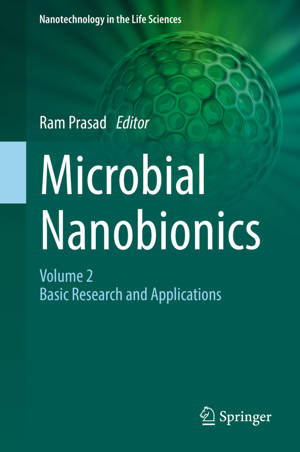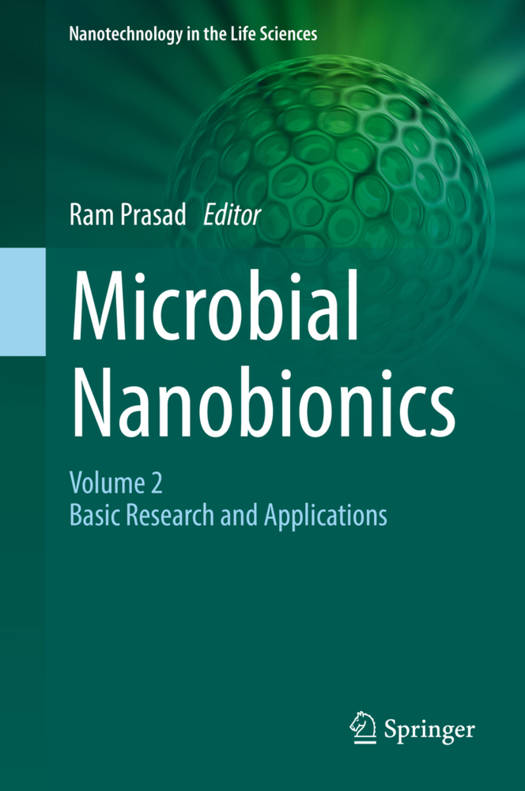
Bedankt voor het vertrouwen het afgelopen jaar! Om jou te bedanken bieden we GRATIS verzending (in België) aan op alles gedurende de hele maand januari.
- Afhalen na 1 uur in een winkel met voorraad
- In januari gratis thuislevering in België
- Ruim aanbod met 7 miljoen producten
Bedankt voor het vertrouwen het afgelopen jaar! Om jou te bedanken bieden we GRATIS verzending (in België) aan op alles gedurende de hele maand januari.
- Afhalen na 1 uur in een winkel met voorraad
- In januari gratis thuislevering in België
- Ruim aanbod met 7 miljoen producten
Zoeken
Microbial Nanobionics
Volume 2, Basic Research and Applications
€ 167,95
+ 335 punten
Omschrijving
Microbial Nanobionics: Volume 2, Basic Research Applications continues the important discussion of microbial nanoparticle synthesis with a focus on the mechanistic approach of biosynthesis towards nanobionics. This volume also explores the toxicity of nanomaterials in microbes and their effect on human health and the environment. Special Emphasis is given to the use of polymeric nanomaterials in smart packing for the food industry and agricultural sector. The future of nanomaterials for detection of soil microbes and their interactions and tools for environmental remedies is also comprehensively covered.
The rich biodiversity of microbes make them excellent candidates for potential nanoparticle synthesis biofactories. Through a better understanding of the biochemical and molecular mechanisms of the microbial biosynthesis of metal nanoparticles, the rate of synthesis can be better developed and the monodispersity of the product can be enhanced. The characteristics of nanoparticles can be controlled via optimization of important parameters, such as temperature, pH, concentration and pressure, which regulate microbe growth conditions and cellular and enzymatic activities. Large scale microbial synthesis of nanoparticles is a sustainable method due to the non-hazardous, non-toxic and economical nature of these processes.
The applications of microbial synthesis of nanoparticles are wide and varied, spanning the industrial, biomedical and environmental fields. Biomedical applications include improved and more targeted antimicrobials, biosensing, imaging and drug delivery. In the environmental fields, nanoparticles are used for bioremediation of diverse contaminants, water treatment, catalysis and production of clean energy. With the expected growth of microbial nanotechnology, this volume will serve as a comprehensive and timely reference.
The rich biodiversity of microbes make them excellent candidates for potential nanoparticle synthesis biofactories. Through a better understanding of the biochemical and molecular mechanisms of the microbial biosynthesis of metal nanoparticles, the rate of synthesis can be better developed and the monodispersity of the product can be enhanced. The characteristics of nanoparticles can be controlled via optimization of important parameters, such as temperature, pH, concentration and pressure, which regulate microbe growth conditions and cellular and enzymatic activities. Large scale microbial synthesis of nanoparticles is a sustainable method due to the non-hazardous, non-toxic and economical nature of these processes.
The applications of microbial synthesis of nanoparticles are wide and varied, spanning the industrial, biomedical and environmental fields. Biomedical applications include improved and more targeted antimicrobials, biosensing, imaging and drug delivery. In the environmental fields, nanoparticles are used for bioremediation of diverse contaminants, water treatment, catalysis and production of clean energy. With the expected growth of microbial nanotechnology, this volume will serve as a comprehensive and timely reference.
Specificaties
Betrokkenen
- Uitgeverij:
Inhoud
- Aantal bladzijden:
- 290
- Taal:
- Engels
- Reeks:
Eigenschappen
- Productcode (EAN):
- 9783030165338
- Verschijningsdatum:
- 11/07/2019
- Uitvoering:
- Hardcover
- Formaat:
- Genaaid
- Afmetingen:
- 156 mm x 234 mm
- Gewicht:
- 603 g

Alleen bij Standaard Boekhandel
+ 335 punten op je klantenkaart van Standaard Boekhandel
Beoordelingen
We publiceren alleen reviews die voldoen aan de voorwaarden voor reviews. Bekijk onze voorwaarden voor reviews.








